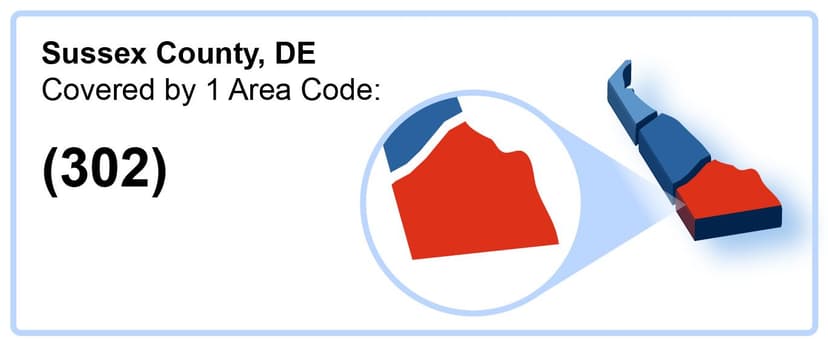What are Sussex County Area Codes?

Area codes are the first three numbers in American phone numbers. The North American Numbering Plan Administrator (NANPA) established area codes to divide the territories it serves in North America into Numbering Plan Areas (NPAs). An area code identifies the specific geographic origin and destination of a phone call. The NANPA provides an area code lookup resource on its website. The Delaware Public Service Commission (PSC) administers and implements area codes in Delaware. Currently, only one area code covers Sussex County.
Area Code 302
Area code 302 is a Delaware telephone code and was put into service in 1947 as one of the original 86 NPAs. Cities and towns in Sussex County within the 302 NPA include Lewes, Georgetown, Rehoboth Beach, Millsboro, and Seaford. Others are Selbyville, Laurel, Bridgeville, Delmar, and Milton.
What are the Best Cell Phone Plans in Sussex County?
The four major phone networks in America are present in Sussex County and provide impressive coverage. Verizon and AT&T top the charts in Georgetown, both with 100% coverage. T-Mobile covers 96.83% of the city, while Sprint has a 94.26% spread.
A 2018 National Center for Health Statistics Survey estimated that 45.9% of Delawarean adults had only cell phones for telephony services. On the contrary, 4% of them relied on landline phones solely. A similar trend was observed for children below 18 years, as 55.9% of them had adopted cell phones exclusively, while an insignificant 1% still used landline phones. This infers that cell phones are taking over as the preferred means of telecommunication in Delaware, including Sussex County.
Voice over Internet Protocol (VoIP) allows users to make phone calls, send text messages, and join video conferences over broadband internet connections. It is an alternative to conventional phone systems that offer Sussex County residents an array of products at affordable prices.
What are Sussex County Phone Scams?
These are scams executed by fraudsters on county residents through telephone interactions. Scammers usually call their targets with spoofed Caller IDs, claiming to be representatives of legitimate institutions. Residents can unmask the identities of suspicious callers using free phone number lookup applications. The following public institutions provide county residents with information on the latest phone scams and protect them from falling victim to scams:
- Sussex County Sheriff's Office
- Delaware Attorney General’s Office
- Federal Trade Commission (FTC)
- Federal Communications Commission (FCC)
Common phone scams in Sussex County include:
What are Sussex County Law Enforcement Impersonation Scams?
In this scam, fraudsters claim to be Sussex County Sheriff deputies and contact residents. The scammers will inform their victims of warrants already issued for their arrests for supposedly missing a court date. They will instruct their targets to pay court fines immediately via prepaid gift cards or wire transfers to avoid arrest. The scammers usually convince their unsuspecting marks that the money paid will be reimbursed once they appear at the Sheriff’s Office. In some cases, they may also try to obtain targets’ confidential information to commit identity and financial theft. The Sussex County Sheriff's Office urges residents never to divulge confidential information, send money, or agree to any condition given by an unknown caller. Residents should end such calls immediately and contact the Sheriff's Office directly on their official phone numbers to confirm the callers’ requests. Sheriff Deputies will never threaten residents for any reason or solicit money over the phone. Applications that offer free phone number lookup services can help to ascertain the identities of unknown callers.
What are Sussex County Social Security Scams?
Fraudsters who pretend to be with the Social Security Administration (SSA) call residents to inform them of a supposed compromise on their social security numbers. They may claim that their targets’ social security numbers were used to open multiple bank accounts for fraudulent transactions. These scammers will threaten lawsuits or arrest if the marks fail to comply with their demands. Typically, the scammers aim to coerce targets into revealing personal or financial information which makes them vulnerable to identity and financial theft. Social security scammers usually spoof their targets’ caller IDs, but reverse number lookup and suspicious phone number lookup services can return identifying information on the actual callers. Although the SSA sometimes makes phone contact, they will never initiate calls to solicit money or personal information. County residents are advised never to pay or divulge sensitive data to unidentified persons over the phone. If you are called by a suspected social security scammer, hang up and report it to the Office of the Inspector General, SSA, online.
What are Sussex County Tech Support Scams?
Scammers take advantage of the ignorance of Sussex County residents to perpetrate tech support scams. They often spoofed their marks’ Caller IDs and pose as employees of reputable computer companies to offer phony technical support. They usually inform targeted residents that they have identified some viruses posing grievous threats to their computers and suggest they must be fixed immediately. Typically, naive residents are made to believe that they may lose all the files on their PC to obtain their compliance. The con artists will request remote access to enable them to delete such viruses and execute other repairs. Once they gain access, these scammers will harvest confidential information, including PINs, passwords, and social security numbers for illegal activities. Residents can, however, uncover this plot by using reverse phone lookup services to determine the genuineness of such unknown callers. Legitimate Tech firms do not initiate these types of calls. Residents who suspect they may have fallen victim to tech support scams can file reports with local law enforcement for investigations. The Consumer Protection Unit of the Delaware Attorney General’s Office provides residents with online resources on how to avoid and report cases of identity theft.
What are Sussex County Loan Scams?
Loan scams aim to exploit Sussex County residents with bad credit reports. Scammers assure such residents of loans or credit cards for a fee that must be paid upfront. The scammers often dismiss any fear their targets may have about their eligibility for loans owing to their poor credit status. They will attempt to obtain their victim’s bank account and personal information, a ploy to commit financial and identity theft. Note that genuine creditors will never make such promises to persons with poor credit histories or lend to them. The FTC urges residents to be wary of creditors who show no interest in their credit histories or request advance payment for loan processing. End such calls to avoid being fleeced. You may perform free reverse phone lookups to ascertain the authenticity of such calls. Residents with unresolved debt issues can contact a credit counseling service for proper assistance.
What are Robocalls and Spam Calls?
Robocalls are phone calls designed to deliver automated messages to mass phone numbers. They are frequently employed in telemarketing and political campaigns for legitimate purposes. However, scammers have adopted them in their schemes because it helps in concealing their true identities. Free reverse phone lookup services can help identify robocalls and prevent you from falling victim to illegal robocalls. Illegal robocalls are also spam calls. Spam calls deliver irrelevant automated messages to persons who have not indicated an interest in receiving such calls. To avoid illegal robocalls, your best options are:
- Hang up if you discover an incoming call is a robocall.
- Reporting unsolicited robocalls to the FTC by calling 1 (888) 382-1222.
- Register your phone number on the National Do Not Call Registry to reduce the inundation of unsolicited robocalls.
- Use call-blocking applications available on your cell phone to block identified spam numbers.
How Can You Spot and Report Sussex County Phone Scams?
Residents must be well informed of the latest scams in town and always stay alert to spot Sussex County phone scams. Reverse phone number lookup services are great for identifying spoofed phone numbers. Signs that a phone call is a scam include:
- The caller uses threats to elicit a response. Scammers intimidate their marks to reveal confidential information. Legitimate organizations will never ask for sensitive data over the phone.
- The caller constantly evades questions about agreement documents for their propositions and often dissuades their victims from independently researching their offers.
- The caller insists on a particular payment method. Scammers often favor untraceable payment means such as prepaid gift cards, wire transfers, and cryptocurrencies.
- An unknown caller offers enticing opportunities and deals with conditions that must be met within short time frames. Legitimate businesses do not operate in this manner.
Several public institutions provide consumer information on how to steer clear of phone scams. Sussex County residents who are scam victims can file reports of their encounters with any of these agencies. They include:
- Sussex County Sheriff's Office - Sussex County residents can file phone scam complaints with the County Sheriff’s Office by calling 1 (302) 855-7830.
- Delaware Attorney General Office: Sussex County residents can file phone scam complaints with the Consumer Protection Unit (CPU) of the Delaware Attorney General’s Office online.
- Federal Communications Commission (FCC): Sussex County residents can file online complaints of phone scam incidents with the FCC.
- Federal Trade Commission (FTC): Sussex County residents can report phone scam complaints online with the FTC. They can also register their phone numbers on the National Do Not Call Registry to significantly reduce the number of unsolicited telemarketing robocalls they get. Any unwanted robocall received 31 days post entry into the DNC registry is a potential scam call and should be promptly reported to the FTC.
